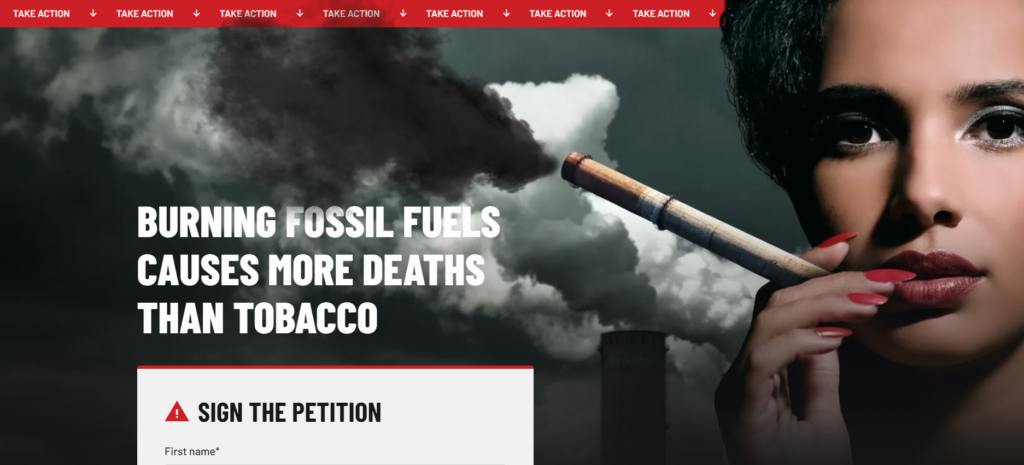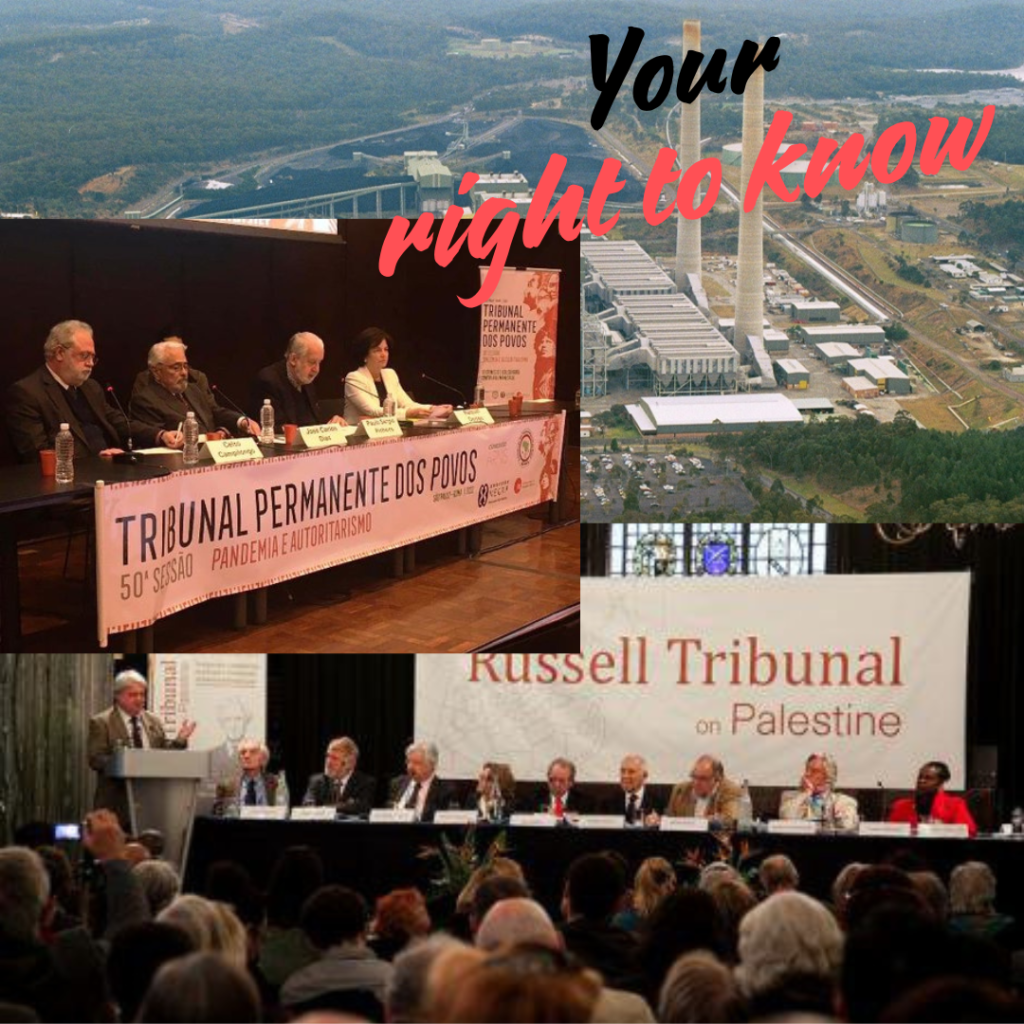Doctors for the Environment Australia, the United Nations and many smaller groups are beginning to get louder about Australia’s air pollution problem – a problem largely related to the burning of fossil fuels.

By Jacquelene Pearson
Air pollution has been in the news this week. Doctors for the Environment declared a Code Red at Australian Parliament House on 14 August to draw attention to the release of their latest report Fossil Fuels are a Health Hazard.
The report by medical group Doctors for the Environment Australia (DEA), handed down with communications collective Comms Declare, was launched by the Assistant Minister for Health and Aged Care, Ged Kearney.
With fossil fuel pollution currently leading to more deaths globally than smoking(1), the report calls on the government to:
- Commit to a phase out of coal, oil and gas because of incontrovertible evidence of health impacts
- Introduce national restrictions on fossil fuel advertising and sponsorships
- Secure federally mandated and standardised ‘climate warning’ labels on advertisements for carbon intensive products
Assistant Minister for Health and Aged Care, Ged Kearney MP acknowledged the impact of climate change, stating: “From extreme heat to more frequent bushfires, climate change is forever changing our environment and how we live. Australia needs a health system that is prepared for these challenges.
“Our National Strategy on Health and Climate lays the foundations for all of society to work together to address the impacts of climate change on Australians’ health and wellbeing”.
DEA’s Executive Director and GP, Dr Kate Wylie said: “Coal, oil and gas are driving dangerous air pollution. This smoke kills – whether it’s coming from a gas stove or a car exhaust, it gets into our lungs and bloodstream and causes disease, disability and death.
“Coal, oil and gas are also the main drivers of escalating climate change which is behind extreme weather such as heat, floods and bushfires whose dire impacts we’ve seen in Australia and overseas.
“As health professionals it’s our role to fearlessly and loudly advocate for the health of all Australians. Just like we called out the health harms of smoking, alcohol, and junk food – even guns- we are now ringing the alarm for fossil fuels.
“And similar to addressing the health impacts of tobacco by first quitting smoking, to address the impacts of fossil fuels we must first quit coal, oil and gas.
“This precautionary approach to health hazards has prompted government regulations. Now is the time for policy makers to show the same leadership and act on fossil fuels- the biggest public health risk humanity has faced.
“If we don’t act on this as a public health priority, simply put, more people are going to die or experience significant illness linked to fossil fuels”
Comms Declare Founder Belinda Noble said: “Fossil fuel pollution is killing more Australians than car crashes, alcohol and gambling combined(2) and yet the fossil fuel industry is allowed to continue spending millions of dollars on promotion every year. Australia was a world leader in restricting tobacco advertising for the public good, and we should stop the promotion of high emission products for the same reason.”
“Combined with the accelerating impacts of an unstable climate, we believe fossil fuels will overtake junk food to become Australia’s most deadly advertised products.”
“There is already global action underway with UN Secretary General António Guterres recently calling for a global fossil fuel ban and restrictions imposed in France, Sydney and dozens of other cities. If our government is committed to protecting Australians and fighting climate change then banning fossil fuel advertising is an obvious first step.”
Read the report here: dea.org.au/fossil_fuels_are_a_health_hazard_report
For more information about the Fossil Ad Ban Campaign and to sign the petition visit: smokekills.com.au
UN Rapporteur agrees
“In 2023 Marcos Orellana, the United Nations Special Rapporteur on human rights and the environmentally sound management and disposal of hazardous substances and waste visited Australia to gather evidence about whether or not the nation has a toxic problem
His report, to be tabled at the UN Human Rights Council General Assembly between September 9 and October 9, takes note of ‘acute toxic challenges’ facing Australia including the ‘toxic impacts of coal mines and coal-fired power plants’ posing ‘serious threats to the environment and to the health of affected communities’.
“The Rapporteur’s report goes on to state that ‘communities have paid the price with premature deaths, terminal illnesses, asthma and other health problems’ and that those same communities ‘continue to be exposed to unsafe levels of air pollutants and toxics from coal mining and coal-fired power stations’.”
Special Rapporteur’s report g2411020.pdf (un.org)
Calls for a cleaner future
In NSW, the community group Future Sooner is holding a first-of-its kind Citizens Inquiry into the health impacts of pollution from coal fired power stations.
Chair of Future Sooner’s Citizens Inquiry into the health impacts of pollution from coal-fired power stations, Dr Ian Charlton, has extended an invitation to all NSW residents living near power stations and ash dams to participate as more and more experts lift the lid on this long-running public health disaster.
“This inquiry comes at the end of almost five decades of silence from the industry and public authorities about the long-term and well-documented public health impacts of electricity generation from coal,” Dr Charlton said. “Communities have also been gagged by Non-Disclosure Agreements and a long-standing cultural cone of silence.”
Dr Charlton said momentum is growing, just as it had with previous public health campaigns on the impacts of cigarette smoke and alcohol consumption, to expose the impacts of burning coal on public health.
“Future Sooner has spent years collecting evidence about the health impacts of coal-fired power stations and now we want to hear from the residents about whether or not, and how, they think their health may have been affected.”
NSW has four coal-fired power plants still operating at Bayswater, Eraring, Mount Piper and Vales Point, and Future Sooner is extending an invitation to residents from the regions surrounding those plants to tell their health stories.
“The volume of damning expert evidence about the impacts of these plants on public health seems to be growing by the day right now,” Dr Charlton said.
Climate Future Citizens Inquiry invitation
Footnotes:
1. Smoking related deaths globally are approx 7 million compared to the 8.1 million linked to fossil fuel pollution.
2. Traffic related air pollution from burning fossil fuels in Australia causes 11,105 premature deaths per year, which is 8.7 times more than national road toll (1,266).
Annually there are 1,742 alcohol-induced deaths, 38 linked to problem gambling (4% of suicides). Junk food is related to 16,400 deaths per year.


